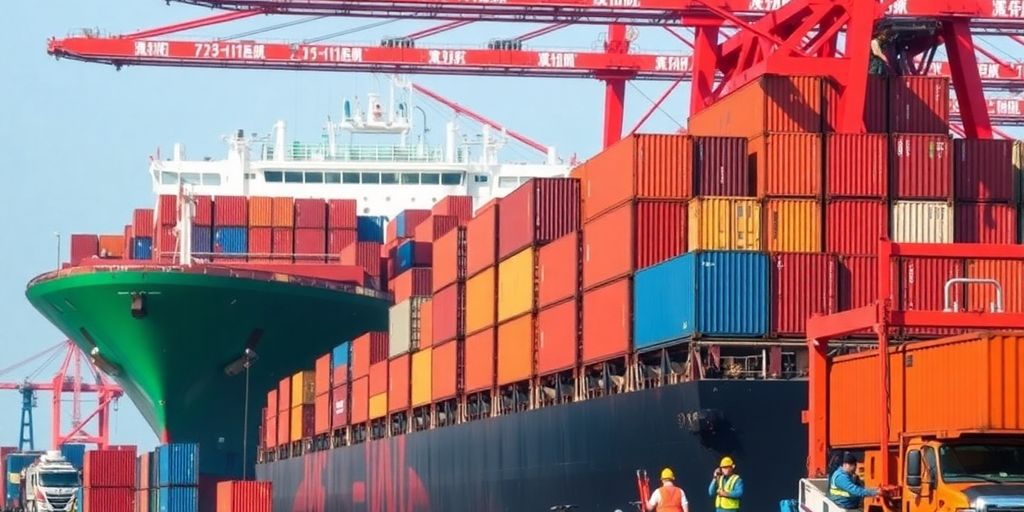Está pensando en enviar mercancías desde China y se ha topado con el término FOB. ¿Qué significa y por qué debería importarle? Bueno, FOB, o Free On Board, es un término de envío que puede marcar una gran diferencia en la forma de gestionar sus importaciones. Le indica cuándo la responsabilidad y el coste del envío se transfieren del vendedor a usted, el comprador. Comprender el concepto FOB China puede ayudarle a evitar costes inesperados y facilitar el proceso de envío. Veamos los puntos clave para comprender mejor este importante término de transporte.
Principales conclusiones
- FOB China significa que el vendedor se hace cargo de los costes hasta que la mercancía está en el barco.
- Una vez que la mercancía está a bordo, el comprador asume todos los riesgos y costes.
- FOB es sólo para envíos marítimos, no aéreos ni terrestres.
- Los compradores tienen que organizar el flete y el seguro después de que la mercancía esté en el barco.
- FOB puede ser rentable, pero requiere una coordinación cuidadosa con los proveedores.
FOB China: Conceptos clave y definiciones
¿Qué significa FOB en términos de transporte?
FOB, o franco a bordo, es un término común en el transporte marítimo internacional que define el punto en el que la responsabilidad y el riesgo de las mercancías se transfieren del vendedor al comprador. En un acuerdo FOB típico, el vendedor es responsable de la mercancía hasta que se carga en un buque en el puerto designado. Una vez que la mercancía está a bordo, el comprador asume la responsabilidad de los costes y riesgos del transporte.
- Responsabilidades del vendedor:
- Responsabilidades del comprador:
FOB Origen vs. FOB Destino
Los términos "FOB Origen" y "FOB Destino" aclaran cuándo se produce la transferencia del riesgo:
- Origen FOB: El comprador asume el riesgo y la responsabilidad una vez que la mercancía sale de las instalaciones del vendedor. Esto significa que el comprador es responsable de cualquier daño o pérdida durante el tránsito desde las instalaciones del vendedor.
- FOB Destino: El vendedor conserva el riesgo hasta que la mercancía llega al lugar especificado por el comprador. El vendedor es responsable de cualquier problema que surja durante el envío.
El papel de los incoterms en los acuerdos FOB
Los Incoterms, abreviatura de International Commercial Terms, son un conjunto de términos comerciales predefinidos publicados por la Cámara de Comercio Internacional (CCI). Son esenciales para el comercio internacional, proporcionando claridad en la división de responsabilidades entre compradores y vendedores. En el contexto de FOB, los Incoterms especifican quién es responsable de los gastos de envío, el riesgo y la manipulación en cada etapa del proceso de envío.
Los incoterms como FOB son vitales para garantizar transacciones fluidas en el transporte marítimo internacional. Ayudan a las partes a comprender sus obligaciones y reducen las posibles disputas sobre las responsabilidades de envío.
Para cualquiera que se ocupe del comercio internacional, comprender Incoterms, como FOBes crucial para una gestión eficaz de la logística y el comercio.
El proceso de envío FOB China: Guía paso a paso
Solicitud de presupuesto
Obtener una cotización del producto es su primer paso en el proceso de envío FOB China. La mayoría de las fábricas en China proporcionarán cotizaciones bajo FOB Incoterms. Esto significa que incluyen los costes hasta el puerto de embarque. Normalmente, verá un precio unitario, el incoterm (FOB) y una ciudad china concreta. Esta ciudad es el puerto desde el que se enviarán sus mercancías. Si necesitas cambiar el puerto, prepárate para discutirlo con tu proveedor, ya que podría afectar al precio.
Confirmación del envío
Tras recibir un presupuesto satisfactorio, es hora de confirmar el envío. Informe a su empresa de logística de que está listo para proceder. Normalmente le enviarán unos papeles para que los firme, confirmando que quiere que se encarguen del envío. Una vez que todo esté listo, reservarán espacio en un barco para su carga. Asegúrese de que todos los datos son correctos y de que se confirma cualquier información que falte.
Procedimientos para el día del envío
El gran día, su empresa de logística y el almacén del vendedor se encargarán de que un camión recoja su mercancía. Si envía un contenedor completo (FCL), el camión llevará el contenedor directamente al almacén del vendedor para cargarlo. Si se trata de una carga inferior a un contenedor (LCL), sus mercancías irán primero a un almacén, donde se combinarán con otros envíos. Una vez cargada, la mercancía se dirige al puerto, se pesa y comienza el proceso de exportación. Es fundamental que la comunicación con el transitario y el proveedor sea clara para evitar contratiempos de última hora.
Factores de coste en los acuerdos FOB China

Comprender los precios FOB
El precio FOB, o franco a bordo, es un término común utilizado en el comercio internacional. Significa que el vendedor cubre todos los costes hasta el momento en que la mercancía se carga en un buque. Una vez que la mercancía está a bordo, el comprador se hace cargo, asumiendo la responsabilidad y los costes. Esto incluye el envío, el seguro y cualquier gasto de manipulación a partir de ese momento. En esencia, el precio FOB permite a los compradores ver exactamente lo que están pagando hasta el puerto de salida, lo que facilita la comparación de costes entre proveedores.
¿Quién paga el flete de los envíos FOB?
En un acuerdo FOB, el comprador es responsable de pagar los costes de flete desde el puerto de origen hasta el destino final. Puede ser una cantidad importante, sobre todo para los envíos de larga distancia. Los compradores también tienen que organizar y pagar el seguro, aunque no es un requisito estricto en condiciones FOB. He aquí un breve resumen de lo que suele cubrir el comprador:
- Gastos de transporte desde el puerto de origen hasta el de destino.
- Seguro, si se elige.
- Gastos de manipulación en la terminal de destino.
- Entrega final en el domicilio del comprador.
Diferencia entre FOB y CIF
FOB y CIF (Coste, Seguro y Flete) son términos de envío comunes, pero tienen diferencias clave. Con CIF, el vendedor corre con los gastos de transporte y seguro hasta que la mercancía llega al puerto de destino del comprador. Esto suele traducirse en precios más altos para el comprador, ya que el vendedor incluye estos costes en el precio del producto. Por el contrario, FOB requiere que el comprador se haga cargo de estos gastos, ofreciendo un mayor control sobre la logística de envío y costes potencialmente más bajos si el comprador puede negociar mejores tarifas de envío.
A la hora de elegir entre FOB y CIF, tenga en cuenta su control sobre el envío y los costes. FOB puede ser más atractivo si cuenta con socios logísticos fiables que puedan gestionar el transporte de forma eficaz. Sin embargo, si prefiere no intervenir, el CIF puede ser la mejor opción.
Además, gastos de envío de China a EE.UU. pueden variar mucho, por lo que conviene comparar precios. Comprender estas diferencias puede suponer un ahorro considerable y facilitar las transacciones.
Cuándo utilizar acuerdos FOB para envíos desde China

Escenarios ideales para el uso de FOB
FOB, o franco a bordo, es una opción popular para el envío de mercancías desde China, especialmente cuando se trata de carga a granel que viaja por mar. Este término es especialmente adecuado para el transporte marítimoFOB, en el que el comprador asume la responsabilidad una vez cargada la mercancía en el buque. Estos son algunos escenarios en los que los acuerdos FOB brillan:
- Cuando el comprador cuenta con un transitario de confianza para gestionar la logística.
- Si el comprador prefiere controlar el proceso de envío una vez cargada la mercancía.
- Cuando se envían grandes cantidades que hacen que el transporte marítimo sea económico.
Comparación del FOB con otros incoterms
FOB es sólo uno de los muchos Incoterms, y entender las diferencias puede ayudarle a seleccionar el más adecuado para sus necesidades. He aquí una rápida comparación:
| Incoterm | Modo de transporte | Punto de transferencia de responsabilidad |
|---|---|---|
| FOB | Mar | Cuando la mercancía está a bordo |
| FCA | Cualquier | Cuando se entrega la mercancía al transportista |
| CIF | Mar | Cuando las mercancías llegan al puerto de destino |
Para envíos que no sean por mar, considere utilizar FCA, que cubre todos los modos de transporte. Mientras tanto, CIF podría ser más adecuado si desea que el vendedor se encargue del envío y el seguro.
El papel de los transitarios
Los transitarios desempeñan un papel crucial en los acuerdos FOB. Gestionan la logística y garantizan que el proceso de envío se desarrolle sin problemas. He aquí por qué son importantes:
- Experiencia en el manejo de papeleo: Conocen los entresijos de la documentación aduanera y la normativa sobre envíos.
- Rentabilidad: Pueden negociar mejores tarifas de envío y seguro.
- Resolución de problemas: En caso de retrasos o problemas, pueden encontrar rápidamente soluciones para que su envío siga por buen camino.
Trabajar con un transitario puede aliviar las complejidades del transporte internacional, lo que hace que FOB sea una opción más atractiva para muchos compradores.
Ventajas y desventajas de FOB China

Ventajas de utilizar FOB
FOB, o franco a bordo, es popular por una razón. Ofrece a los compradores más control sobre el proceso y los gastos de envío. Los compradores pueden elegir sus propios transitarios, negociar mejores tarifas de envío y decidir las mejores rutas para sus mercancías. Esto significa que pueden ahorrar mucho dinero. Los vendedores también se benefician porque una vez que las mercancías salen de su almacén, su responsabilidad termina. Pueden centrarse en su actividad principal sin preocuparse de la logística de los envíos.
- Los compradores gestionan sus envíos y pueden buscar las mejores ofertas.
- Los vendedores transfieren las responsabilidades de envío y pueden finalizar las ventas rápidamente.
- Ambas partes tienen claras sus funciones, lo que reduce la posibilidad de disputas.
Posibles inconvenientes de los acuerdos FOB
Sin embargo, FOB no está exento de dificultades. Para los compradores, especialmente los que no están familiarizados con los envíos internacionales, la gestión de toda la logística puede resultar abrumadora. Son responsables de todo, desde organizar el transporte hasta gestionar el despacho de aduanas y el seguro. Si algo va mal durante el tránsito, el comprador tiene que ocuparse de ello. Para los vendedores, aunque el FOB les libera de las tasas de embarque, significa que pierden el control sobre la mercancía una vez que sale del puerto. Esto podría afectar a su reputación si el comprador tiene problemas.
- Los compradores asumen todos los riesgos una vez que las mercancías se cargan en el buque de transporte.
- Los nuevos compradores pueden considerar que la gestión logística es compleja y arriesgada.
- Los vendedores pueden tener problemas de reputación si los compradores tienen problemas con el envío.
FOB frente a otros términos de envío
Cuando se compara FOB con otros términos de envío como CIF (Coste, Seguro y Flete) o FASFOB destaca por ofrecer a los compradores más control y costes potencialmente más bajos. Con el CIF, los vendedores se encargan del transporte y del seguro, lo que puede suponer precios más altos para los compradores. Por otro lado, el FAS permite a los vendedores minimizar los costes transfiriendo la responsabilidad a los compradores una vez que las mercancías llegan al puerto. FOB logra un equilibrio, ofreciendo flexibilidad y control a los compradores y simplificando la logística para los vendedores.
- FOB da el control a los compradores, a diferencia de CIF, que incluye seguro y costes más elevados.
- El FAS transfiere la responsabilidad en el puerto, lo que ofrece otra opción a los vendedores preocupados por los costes.
- Elegir el plazo adecuado depende de las necesidades y la experiencia de ambas partes.
FOB China es un término de envío versátil, que ofrece distintas ventajas tanto a compradores como a vendedores. Aunque exige un mayor conocimiento de la logística por parte de los compradores, el ahorro y el control potenciales lo convierten en la opción preferida para muchos. Los vendedores disfrutan de la simplicidad de transferir la responsabilidad una vez que las mercancías salen de sus manos, lo que les permite centrarse en la producción y las ventas.
Errores comunes sobre FOB China
FOB es sólo para envíos marítimos
Un malentendido muy extendido sobre FOB (Free On Board) es que es exclusivo para envíos marítimos. Mientras que el FOB está hecho a medida para el transporte marítimo y fluvialpero no significa que sea la única opción para envíos internacionales. Por ejemplo, si está considerando otros modos como el aéreo o el ferroviario, el término FCA (Free Carrier) podría ser más adecuado. El sitio Condiciones de envío FOB es específico en cuanto a su uso, y comprenderlo puede evitar contratiempos logísticos.
FOB no incluye seguro
Otro mito común es que los acuerdos FOB cubren automáticamente el seguro, pero no es así. Normalmente, la responsabilidad del seguro recae en el comprador, a menos que se negocie lo contrario. Es una buena idea que cualquiera de las partes contrate un seguro para proteger sus intereses. Recuerde que Precio FOB generalmente incluye el coste hasta el puerto de embarque, no más allá, por lo que el seguro es una consideración aparte.
Aclarar las responsabilidades FOB
Muchos asumen que las responsabilidades del vendedor terminan una vez que las mercancías abandonan sus instalaciones, lo que no es del todo exacto. En realidad, el vendedor sigue siendo responsable hasta que la mercancía se carga en el buque. Esta distinción es crucial para comprender la responsabilidades en el transporte marítimo. Un malentendido en este sentido puede dar lugar a disputas sobre quién asume el riesgo durante determinadas fases del proceso de envío.
Las condiciones FOB pueden ser complicadas, pero conocerlas bien puede evitarle costes inesperados y confusiones. Aclare siempre las condiciones y responsabilidades por adelantado para evitar sorpresas posteriores.
Consideraciones jurídicas en las transacciones FOB China

Legislación aplicable a los acuerdos FOB
Al tratar con Condiciones FOBes importante saber que las normas pueden variar según el país. La Cámara de Comercio Internacional (CCI) establece unas directrices ampliamente reconocidas, pero también pueden aplicarse las leyes locales. Especifique siempre qué marco jurídico rige su acuerdo para evitar malentendidos.
Aduanas y derechos de importación
Cuando importar de ChinaEn los contratos FOB, el comprador suele asumir estas responsabilidades una vez que la mercancía sale del lugar donde se encuentra el vendedor. En los contratos FOB, el comprador suele asumir estas responsabilidades una vez que la mercancía sale de la ubicación del vendedor. Esto significa que debe estar preparado con todos los documentos necesarios para evitar retrasos y costes adicionales.
Requisitos de seguro
El seguro es una parte delicada de los acuerdos FOB. Normalmente, el comprador contrata y paga el seguro una vez que la mercancía está a bordo del buque. Es crucial asegurarse de que la cobertura es adecuada para el viaje, a fin de protegerse frente a posibles pérdidas.
Consejo: Compruebe su póliza de seguro para asegurarse de que cubre todos los riesgos desde el momento en que la mercancía se carga en el buque.
En resumen, comprender los aspectos legales de las transacciones FOB puede ayudar a evitar errores costosos y garantizar un proceso de envío más fluido.
Consejos prácticos para gestionar los envíos FOB desde China
Trabajar con proveedores chinos
Al tratar con proveedores chinos, es crucial mantener una comunicación clara y abierta. Confirme siempre por escrito todos los detalles del envío para evitar malentendidos. Asegúrese de saber quién es responsable de cada parte del proceso de envío. Los proveedores pueden facilitar un presupuesto FOB, que incluye los costes hasta el momento en que la mercancía se carga en el barco. Si necesita cambiar el puerto de exportación, coméntelo antes con su proveedor para ajustar los precios en consecuencia.
Coordinación con empresas de logística
Elegir la empresa de logística adecuada puede marcar la diferencia. Es aconsejable obtener el asesoramiento de expertos a la hora de elegir un socio logístico, sobre todo si es nuevo en la importación. Estas empresas pueden ayudarle a sortear las complejidades del transporte y las aduanas. Una buena empresa de logística también le ayudará a coordinar la recogida y la entrega, garantizando que sus mercancías lleguen a su destino de forma eficiente.
Garantizar la fluidez de las operaciones de transporte
Para garantizar un proceso de envío sin problemas, planificar con antelación y deje tiempo suficiente para el envío y el despacho de aduanas. Esto puede evitar la necesidad de recurrir a costosas opciones de envío urgente. Además, considere la posibilidad de realizar el envío durante los periodos de menor actividad para reducir costes. También es beneficioso trabajar con transitarios que puedan negociar mejores tarifas y manejar las complejidades del envío desde China. Aunque a menudo se prefiere el transporte marítimo, conlleva sus propias dificultades, así que prepárate para posibles retrasos y planifica en consecuencia.
Recuerde que la clave del éxito de un envío FOB es la preparación y la comunicación. Si se mantiene informado y organizado, podrá minimizar los riesgos y asegurarse de que sus mercancías llegan a tiempo y en buenas condiciones.
Gestionar los envíos desde China puede ser complicado, pero con los consejos adecuados, puede hacerlo más fácil. Empiece por hacer un seguimiento de sus pedidos y comunicarse claramente con sus proveedores. Compruebe siempre la calidad de sus productos antes de que salgan de fábrica. Si necesita ayuda, visite nuestro sitio web para obtener más recursos y apoyo!
Para terminar: FOB China en pocas palabras
Ahí lo tiene. Navegar por el envío FOB desde China puede parecer un poco abrumador al principio, pero una vez que se le coge el truco, es bastante sencillo. La clave está en entender los términos y saber de qué es responsable cada parte. Tanto si es un importador experimentado como si acaba de empezar, FOB ofrece una forma flexible y a menudo rentable de gestionar sus envíos. Recuerde que el vendedor se encarga de todo hasta que la mercancía está en el barco, y entonces todo corre de su cuenta. Asegúrese de obtener los presupuestos, conocer los costes e incluso, si es nuevo en el sector, trabajar con una empresa de logística. Con un poco de planificación y los socios adecuados, tus productos llegarán a tus manos en un abrir y cerrar de ojos. ¡Feliz envío!
Preguntas frecuentes
¿Qué es el precio FOB?
El precio FOB significa que el vendedor incluye el coste de llevar la mercancía al puerto y cargarla en el buque. Una vez que la mercancía está en el buque, el comprador asume la responsabilidad.
¿Quién paga los gastos de envío en los acuerdos FOB?
En términos FOB, el comprador suele ser responsable de los gastos de envío una vez que la mercancía está en el barco.
¿En qué se diferencia FOB de CIF?
FOB significa que el comprador paga el transporte y asume la responsabilidad una vez que la mercancía está en el barco. CIF significa que el vendedor paga el envío y el seguro hasta que la mercancía llega al país del comprador.
¿Es necesario un seguro para los envíos FOB?
El seguro no es obligatorio para los envíos FOB, pero es una buena idea que tanto el comprador como el vendedor lo tengan, por si acaso.
¿Qué significa FOB en el transporte marítimo?
FOB significa "Free on Board" (franco a bordo). Significa que el trabajo del vendedor consiste en subir la mercancía al buque, y luego el comprador se hace cargo.
¿Se puede utilizar FOB para envíos aéreos?
No, FOB se utiliza principalmente para envíos marítimos. Para el transporte aéreo o de otro tipo, puede ser mejor utilizar otros términos, como FCA.





